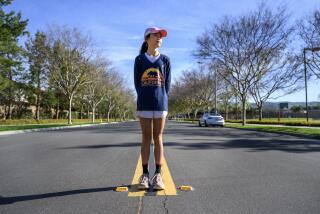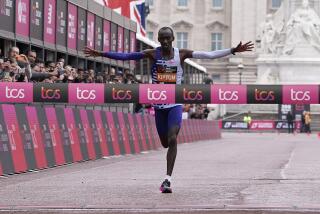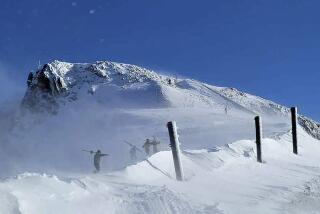Marathoner Meb Keflezighi continues to persevere
MAMMOTH LAKES -- Yordanos Keflezighi and her shopping cart made it just a few steps down the supermarket aisle before they were stopped by another shopper.
“Oh, you’re Meb’s wife,” the woman said, more a declaration than a question.
Keflezighi politely nodded.
“Yes,” she said. “Yes I am.”
Then, out of the woman’s earshot, she added an explanation.
“Process of elimination. It’s very unlikely to see African Americans here,” she said of Mammoth Lakes, which counts just four dozen African Americans among its nearly 7,000 year-round residents.
Yet in this tiny resort town, hidden nearly 8,000 feet up the eastern slopes of the Sierra Nevada, Meb Keflezighi stands out for more than just his heritage. A three-time Olympic distance runner, Keflezighi has done almost as much to put Mammoth on the map as snow. Which is why three framed and autographed pictures of him hang from the walls of the Snowcreek Athletic Club. It’s why his 2010 autobiography “Run to Overcome” remains on back order at Booky Joint, the town’s main bookstore.
And it’s why his wife can’t go grocery shopping without being recognized.
“Mammoth have always been very welcoming,” says Keflezighi, who helped draw dozens of world-class distance runners to Mammoth when he broke the American record at 10,000 meters a month after moving here in 2001. “The community is very nice. People appreciate what I have done.”
The same goes for San Diego, where Keflezighi grew up, where his family still lives and where, on June 6, the city celebrated Meb Keflezighi Day. It was an honor that included the uncomfortable responsibility of throwing out the first pitch at a Padres game.
“I made it,” Keflezighi bragged of the throw, which carried to the plate on the fly.
What Keflezighi has done off the baseball diamond is a bit more noteworthy, however. In January, for example, he became the oldest man to win the U.S. trials in the marathon, the distance at which he earned an Olympic silver medal in 2004. He has too many national championships and American records to count and last Sunday he proved he’s still incredibly fit by thrashing Olympic trials champion Ryan Hall by nearly 21/2 minutes to win the Rock ‘n’ Roll half-marathon in San Diego.
Should he reach the podium in London, Keflezighi would join Frank Shorter as the most decorated American in Olympic marathon history.
Yet his most impressive long-distance run may have come 27 years ago when he fled his native Eritrea, a tiny East African country so impoverished Keflezighi’s house had no electricity. He didn’t see his first car or television until he was 10.
To escape the country’s civil war, Keflezighi and his family headed first to Italy, then to San Diego, where his shyness and his secondhand clothes made him a subject of ridicule. That ended in seventh grade, though, when his physical education teacher offered a T-shirt to any kid who could run a mile in under 6 minutes 15 seconds.
Keflezighi did it in 5:20 — and he still has the red Roosevelt Junior High Mile Club shirt to prove it.
He lowered that time nearly a minute by the end of ninth grade, inspiring a classmate to write in Keflezighi’s yearbook that he would compete in the Olympics someday.
“I really had no idea what the Olympics were,” Keflezighi says.
Nor was his family particularly interested in finding out. After their struggles in Africa, Keflezighi’s parents insisted their 11 children concentrate on school, not sports, so by the time Meb graduated he had not only run 4:05.58 for the mile, but had a 3.95 grade-point average, was conversant in four languages and had received offers from Brown, Princeton, Harvard and Stanford.
He eventually settled on UCLA — which proved to be almost as life-changing a decision as the one to leave Eritrea because in Westwood, Keflezighi met Bob Larsen, an innovative coach whose faith in high-altitude training would come to shape Keflezighi’s career.
“Bob,” the runner says now, “has been like a father to me.”
It was also at UCLA that Keflezighi became a U.S. citizen, taking the oath of allegiance on a brilliant July morning from a bluff overlooking the beach at Point Loma. Two years later he was representing his new country in the 10,000-meter final in the Sydney Games before stepping up to the marathon and finishing second four years later in Athens.
In a long-sleeved white T-shirt, black lycra shorts, knee-high white socks and a dark wool cap that covers his bald head, Keflezighi looks even smaller than the 5 feet 7, 127 pounds he claims. But as he runs along the isolated roads that crisscross the ranch lands below Mammoth, it’s obvious his body is perfectly suited to covering upward of 130 miles a week at high altitude, much of it at so quick a pace Keflezighi’s regular training partner is not another runner but a coach on a bicycle.
And after a decade of doing this his resting pulse rate is 38 — though he’s rarely at rest, his wife says. When he’s not running, he’s stretching or doing sit-ups — anything that might make him more efficient.
“There are so many guys that have better raw talent,” says Yordanos, who met her husband at a social event for Eritrean emigres eight years ago and married him 15 months later. “The difference is the small things. I know there’s a lot of talk out there about ‘oh, genetics. He’s African so that works to your advantage.’
That’s ridiculous, she says. “And I know that because I’ve been around other athletes who are just as talented as Meb. The difference is, this guy sacrifices. It’s a 24-hour thing.”
Larsen agrees.
“Meb being Meb, he does it to exact standards,” he says. “Meb is so disciplined. That’s why he’s still in the game and winning races.”
Now 37, Keflezighi should be preparing for his fourth Olympics. But the trials for the 2008 Games proved disastrous in more ways than one with Keflezighi, suffering from dehydration, breaking a hip en route to finishing eighth. Then after the race he learned that his friend and training partner Ryan Shay had died of a heart attack after collapsing less than six miles into the race.
It would be a year and half before Keflezighi would compete in another marathon. And when he did, racing for both himself and Shay, he ran a lifetime-best 2:09:21 in London.
“We’re sitting here because I didn’t make the 2008 Olympics. I’ve never given up. If you never give up and you have the passion, nobody can tell you what you can and can’t do,” says Keflezighi, who has run his four fastest marathons since the 2008 trials.
Yet the clock, Keflezighi will tell you, is immaterial in running because the medals are awarded based on place, not time. Keflezighi is the eighth-fastest American marathoner in history but he doesn’t rank among the top 400 all time. And in Athens, he was the 38th fastest runner to start the race — but the second to finish it.
“People don’t care how fast you run. They want to know whether you medaled at the Olympics or won New York,” says Keflezighi, who has done both. Not surprisingly, the vanity plates on his 2009 Infiniti read RAN2WIN; they say nothing about his finishing time.
Regardless of what happens this summer, though, the London Games will be his last Olympics, Keflezighi says. After fleeing a war, crossing an ocean and a continent, then climbing to the top of a mountain, Keflezighi says he can finally see the finish line. And it’s all downhill from here.
“Sometimes I have to pinch myself to see is it really happening? But I’m very appreciative and I’m blessed,” says Keflezighi, who says a silent grace before every meal. “I just try to do the right thing 24/7. I never really rest until I put my head on the pillow.
“Every day that I see the sun it’s a different day, a different adventure and I’m thankful for that.”
More to Read
Go beyond the scoreboard
Get the latest on L.A.'s teams in the daily Sports Report newsletter.
You may occasionally receive promotional content from the Los Angeles Times.







